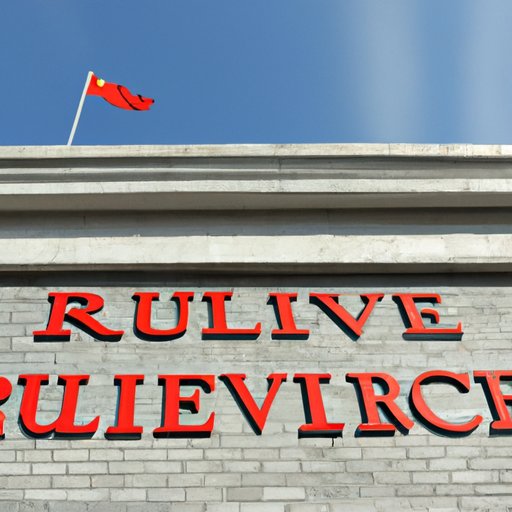Introduction
The Cultural Revolution was a period of political and social upheaval in China from 1966 to 1976, initiated by Chairman Mao Zedong in an effort to reassert his authority over the Chinese Communist Party (CCP). The Cultural Revolution was marked by widespread violence, disruption of public life, and attacks against intellectuals and other perceived enemies of the state. In this article, we will explore the purpose of the Cultural Revolution and examine its impact on contemporary Chinese society.

Analyzing the Purpose of the Cultural Revolution from a Historical Perspective
Mao Zedong had a vision for China that was based on a radical interpretation of Marxist-Leninist ideology. He believed that the Chinese people should be mobilized to overthrow the existing social order and create a new socialist society. This would require the elimination of all aspects of the traditional Chinese culture and the establishment of a new communist culture based on the principles of class struggle and proletarian dictatorship.
Mao saw the need for a “Great Proletarian Cultural Revolution” to achieve his vision for China. According to Mao, the Cultural Revolution was necessary to purge the CCP of bourgeois elements, root out revisionism, and promote revolutionary ideology among the masses.
The Cultural Revolution was also motivated by the historical context of the time. In 1965, Mao had been removed from power after losing a power struggle with Liu Shaoqi and Deng Xiaoping. This left Mao feeling threatened by the “capitalist roaders” within the CCP and determined to reassert his authority. The Cultural Revolution was Mao’s attempt to regain control of the party and restore his position as leader of China.
Exploring the Political, Social, and Economic Objectives of the Cultural Revolution
The primary political goal of the Cultural Revolution was to consolidate Mao’s power within the CCP and eliminate any potential challengers. To do this, Mao launched a campaign against “counterrevolutionary forces” and “capitalist roaders,” which included the purging of intellectuals and officials who were seen as threats to his rule. The Cultural Revolution also sought to strengthen the party’s control over the government and extend its influence over society.
The social objectives of the Cultural Revolution were to create a unified Chinese society and promote revolutionary values among the population. Mao sought to break down traditional Chinese values and replace them with a new communist culture based on class struggle and proletarian dictatorship. To achieve this, he launched campaigns against religion, Confucianism, and traditional art forms.
The economic aims of the Cultural Revolution were to transform China into a modern industrial power. This included the construction of factories and infrastructure, the development of science and technology, and the establishment of a planned economy. Mao also sought to increase agricultural production and reduce poverty in rural areas.
Examining the Impact of the Cultural Revolution on China’s Development
The Cultural Revolution had a profound effect on China’s development. In the rural areas, the collectivization of agriculture led to increased production but also caused widespread famine and poverty. In the cities, the destruction of industry and infrastructure caused widespread unemployment and disruption of public life.
The Cultural Revolution also had a major impact on education and culture. Universities and schools were closed, academic freedom was restricted, and traditional art forms were suppressed. This resulted in a generation of Chinese citizens who lacked the skills and knowledge to participate effectively in the modern economy.

Examining the Role of Mao Zedong in the Cultural Revolution
Mao Zedong played a central role in the initiation and leadership of the Cultural Revolution. He was the driving force behind the movement, providing ideological inspiration and setting the direction of the revolution. Mao was also responsible for organizing the Red Guards, the paramilitary groups that enforced his policies and carried out violent attacks against his perceived enemies.
Mao’s role in the Cultural Revolution has had a lasting impact on contemporary Chinese society. While he is still revered by some as a great leader, others view him as a tyrant who caused immense suffering and destruction. His legacy remains a source of debate and controversy in contemporary Chinese politics.
Investigating the Legacy of the Cultural Revolution on Contemporary Chinese Society
The legacy of the Cultural Revolution is still evident in contemporary Chinese society. Politically, it has left a legacy of authoritarianism and suppression of dissent. Socially, it has resulted in a lack of trust in the government and a reluctance to challenge the status quo. Economically, it has led to inequality and poverty in many rural areas.
The Cultural Revolution has also had a lasting influence on current Chinese politics. The events of the Cultural Revolution are still used by the CCP to justify its authoritarian rule and suppress opposition. The memory of the Cultural Revolution is also invoked by dissidents to highlight the government’s human rights abuses and call for greater democracy.
Conclusion
The Cultural Revolution was a period of political and social upheaval in China from 1966 to 1976, initiated by Mao Zedong in an effort to reassert his power within the CCP. The objectives of the Cultural Revolution included the consolidation of Mao’s power, the promotion of revolutionary values, and the transformation of China into a modern industrial power. The Cultural Revolution had a profound impact on China’s development and its legacy is still evident in contemporary Chinese society.
The Cultural Revolution has left a legacy of authoritarianism and suppression of dissent in political life, a lack of trust in the government in social life, and inequality and poverty in economic life. Its memory is still invoked by the CCP to justify its rule and by dissidents to highlight human rights abuses. The Cultural Revolution has had a lasting influence on contemporary Chinese society and its effects are still being felt today.
This article has significant controversies. It is important to respect the differing beliefs of individuals and different forms of societal organization.
(Note: Is this article not meeting your expectations? Do you have knowledge or insights to share? Unlock new opportunities and expand your reach by joining our authors team. Click Registration to join us and share your expertise with our readers.)
